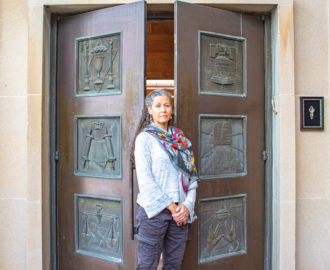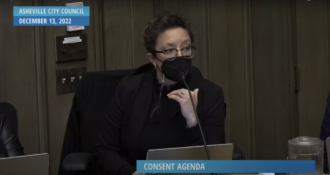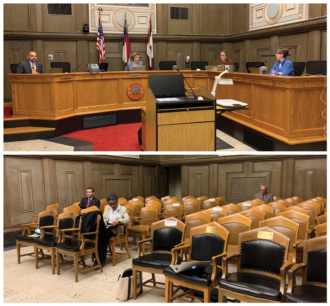Asheville City Council had its annual retreat to focus on a post-Tropical Storm Helene recovery plan. As Council members plotted a course, staff laid out a bleak fiscal landscape the city will have to navigate post-Helene.


Asheville City Council had its annual retreat to focus on a post-Tropical Storm Helene recovery plan. As Council members plotted a course, staff laid out a bleak fiscal landscape the city will have to navigate post-Helene.

“Recent letters and news reports have shown clearly that for relief after the flooding, public housing residents in Asheville have more problems and got dumped on, evicted and neglected by the city again.”

Local reactions to the Israel-Hamas war have stirred strong feelings from Zionists and pro-Palestinian activists. Underlying their disagreement is Asheville’s history of long-simmering antisemitism.

The majority of the funds — $3.4 million — will help residents with rent and down-payment assistance and home repairs. The city will seek nonprofit partners to administer the grants.

Opponents say downtown plan will further marginalize the unhoused population and duplicate services city should be providing.

The bonds, if all approved by voters in November, would provide $20 million for housing, $20 million for transportation, $20 million for parks and recreation and $20 million for public safety.

The mayor shared her enthusiasm about a potential business improvement district, or BID, in the city’s downtown.

“I would give more weight to people who have invested sweat, money and time into enterprises that, should they fail, would mean disaster to them, their families and their employees.”

“It’s going to take a historic effort to close the gaps in housing supply that are close to the places where people work, shop and entertain themselves and where there may also be options for walking, biking or taking mass transit.”

“COVID was the most disruptive thing that cities in America have ever experienced. It had a devastating effect on cities and to right that shift has really been a tremendous struggle,” Mayor Esther Manheimer told members of CIBO.

“Perhaps it will wake people up to the fact that they really are leading the city over a cliff.”

At the request of Council member Kim Roney, six consent agenda items pertaining to the Asheville Police Department were singled out for discussion and separate votes. Over an hour of deliberation and public comment followed.

“We’ve seen a steady flow of people who are Jewish who’ve come [here] because they see a vibrant Jewish community that they can be part of,” Rabbi Batsheva Meiri of Congregation Beth HaTephila tells Xpress. “And so Asheville becomes attractive to them.”

“Asheville peace activists are guided by MLK and many others who were often threatened and imprisoned for their acts of civil resistance.”


“Perhaps there was a mistake, but Asheville City Mayor Esther Manheimer forgot to include an entire paragraph WNC4Peace submitted for an International Day of Peace proclamation.”

Asheville Parks and Recreation surveys residents for a new wellness-focused food hub, April is Food Waste Reduction Month, Ivory Road Café & Kitchen hosts Macarons & Mimosas, and more local food news.

Local restaurant owners face increasing challenges and difficult decisions as Buncombe County lowers dining room capacity to 30%.

“The mayor’s curfew puts Asheville residents, especially our already over-policed black communities, at increased risk of police violence.”

“Buncombe County Board of Commissioners Chairman Brownie Newman and Asheville Mayor Esther Manheimer have failed miserably with their response to the virus among us.”

With nine people present in the echoing City Hall chamber, Council members on March 24 unanimously approved a consent agenda that granted Mayor Esther Manheimer broad emergency powers.